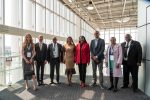Against a backdrop of global economic uncertainty, Namibia positioned itself at the epicentre of a revitalised Commonwealth trade revolution yesterday, hosting the inaugural Commonwealth Business Summit alongside an unprecedented gathering of Trade Ministers in Windhoek. With a bold target of $2 trillion in intra-Commonwealth trade by 2030, the summit, described as a “platform for action, not platitudes” by Commonwealth Secretary-General Shirley Ayorkor Botchwey, offers Namibia a critical pathway to diversify its economy, attract vital investment, and harness the bloc’s unique advantages for inclusive growth.
The historic significance of the event, marking the first time the Commonwealth Trade Ministers Meeting has been held outside London, was underscored by Namibia’s Minister of International Relations and Trade, Selma Ashipala-Musavyi. Welcoming delegates to the “Land of the Brave,” Minister Ashipala-Musavyi framed the summit within Namibia’s own transformative moment – celebrating the nation’s first female President, Dr. Netumbo Nandi-Ndaitwah – and highlighted its alignment with national priorities. “We are meeting here to work towards growing trade… but it is our common goal of building our resilience through unlocking investment opportunities, strengthening partnerships and charting a more inclusive and resilient path that unites us,” she declared, invoking the spirit of ‘Ubuntu’. She explicitly positioned Namibia as a prime investment destination, showcasing opportunities in energy, infrastructure, mining, the blue economy, logistics, and digital innovation, underpinned by a stable policy environment and a youthful, trainable workforce. Key institutions like the Namibia Investment Promotion and Development Board (NIPDB) and the Namibia Chamber of Commerce and Industry (NCCI) were spotlighted as vital conduits for partnerships.
Secretary-General Botchwey articulated a compelling economic vision, centring on harnessing the tangible “Commonwealth Trade Advantage” – a massive market of 2.7 billion people, shared language and legal systems, deep trust, and a demonstrable 21% average cost saving on trade between member states. Placing trade, finance, and economic resilience at the heart of the Commonwealth’s new strategic plan, she outlined three non-negotiable imperatives for achieving shared prosperity: Inclusion, Innovation, and Investment. Inclusion demands empowering Micro, Small, and Medium Enterprises (MSMEs), which constitute over 80% of Commonwealth businesses, alongside women entrepreneurs and youth – a point where she lauded Namibia’s “strong female leadership across government and industry” as inspirational. Innovation focuses squarely on the digital future, requiring modernised legal frameworks, digital public infrastructure, and embracing e-commerce and data-driven supply chains – areas where Namibia seeks growth.
The Investment imperative carries profound significance for Namibia. Botchwey stressed the need for “stronger pipelines for blended finance” and unlocking capital into sectors where the Commonwealth holds a competitive edge, explicitly naming Renewable Energy and Critical Minerals – two pillars central to Namibia’s own economic diversification strategy. With intra-Commonwealth Foreign Direct Investment (FDI) soaring to $172 billion in 2022 – quadruple its 2015 level – the push to make the Commonwealth the “world’s most investable market network” presents Namibia with a golden opportunity to channel funds into its burgeoning green hydrogen projects, vast solar potential, and strategic mineral resources like copper, vital for the global energy transition.
Minister Ashipala-Musavyi further amplified the continental context, urging Commonwealth members to actively support the African Continental Free Trade Area (AfCFTA), emphasising the critical need to “increase intra-African trade, industrialise Africa and attract investment.” This dual focus – leveraging Commonwealth networks while deepening African integration – reflects Namibia’s strategic approach to navigating complex global trade headwinds, including recent diamond sector challenges highlighted by other ministers. The Summit’s dedicated focus on SMEs, women entrepreneurs, digital trade, and climate-smart supply chains directly addresses Namibia’s domestic economic ambitions, aiming to build resilience beyond traditional extractive exports.
Both leaders framed the Windhoek gathering as a decisive shift from dialogue to tangible deals. Botchwey challenged delegates to leave “not just with declarations, but with deals,” and “not just with good intentions – but with a shared agenda for inclusive, innovative, and investable growth.” For Namibia, the successful hosting of this landmark summit, coupled with the concrete connections forged between its showcased sectors and global investors within the Commonwealth’s trusted network, represents more than diplomatic prestige. It is a vital economic lever, potentially accelerating investment, diversifying exports, creating skilled jobs, and solidifying the nation’s role as a proactive architect of its sustainable economic future within a rapidly evolving global trade landscape. The eyes of a third of the world’s population are now firmly on Windhoek’s potential.










